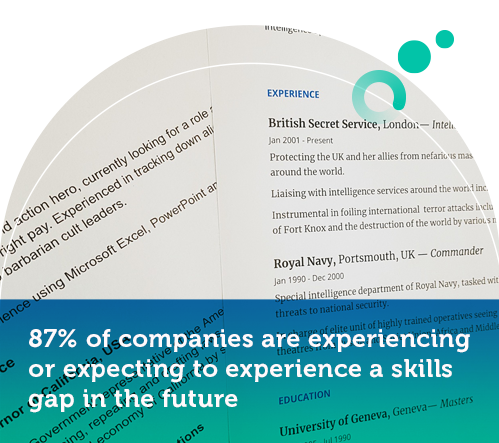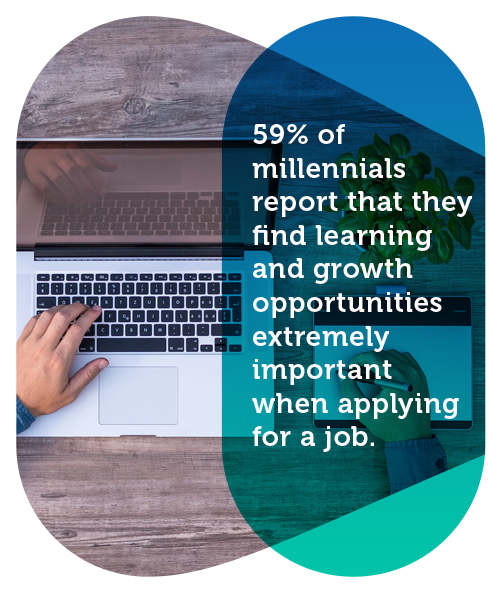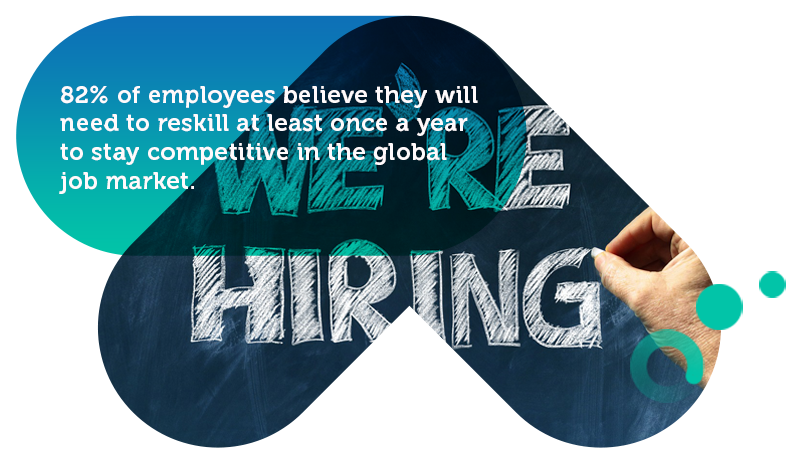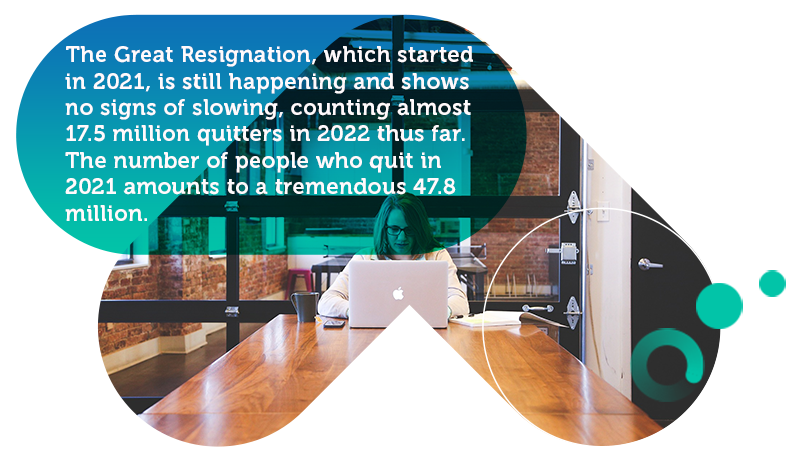
Zero-Budget Recognition: How to Reward Employees Without Money?
Money isn’t the only way to motivate employees—what if the secret to a thriving team lies in meaningful, zero-budget recognition?


Co-founder of WCAG Pros

Owner of Medicare Solutions

Head of Marketing Content at Personnel Checks

HR manager at Joloda Hydraroll

Growth & Marketing Consultant

Co-founder and CEO of STADIUM & SnackMagic

CEO and Founder of Breadnbeyond

Co-Founder of Milkwhale

Digital Marketing Manager of Explainerd
Throughout history, there’s always been a demand for new skills in the workplace. And with the Fourth Industrial Revolution in progress, heightened by the impact of COVID-19, the need for upskilling and reskilling America is now more paramount than ever.
The blurring of the physical and digital boundaries changed our way of life and work practice.
Hence, some employees lack the skills necessary to do their jobs properly. Because of the rapid fusion and development of new technologies, building critical skills is the top priority for HR in 2022.
On top of the revolution and the pandemic, businesses are also dealing with a massive labor shortage. As of May 2022, the US unemployment rates are at 3.6% as before the pandemic, but the number of open positions is constantly rising.
One of the reasons for the high number of available job opportunities is that candidates don’t have the skills and qualifications necessary for the current job positions, especially for novel ones which require new and advanced skill sets.
Considering this and the fact that 87% of companies are experiencing or expecting to experience a skills gap in the future, upskilling and reskilling America is becoming the best strategy to tackle this issue.
This article examines the notions of upskilling and reskilling and shares experts’ experience with the processes at the workplace to provide more insight.

Technology continually creates novelties in the workplaces that require up-to-date skills. It is up to companies to either find new workers who have the necessary abilities or improve the skills of their current ones. Since hiring new candidates costs about 3 times more, employers often resort to upskilling the workforce.
But what is upskilling?
A simple upskilling definition means to provide employees with more advanced skills to better enable them in their current roles. But upskilling doesn’t only happen at an individual level.
It can also refer to a whole workforce upskill where the entire company’s staff goes through a shift to keep up with technology.
59% of millennials report that they find learning and growth opportunities extremely important when applying for a job.
Matt Post, the co-founder of WCAG Pros, expressed his opinion on the importance of upskilling employees. “In order to stay competitive, workers must continuously acquire new skills and upskill. This not only benefits the individual but can also increase employee commitment.
By investing in employee development and helping them learn new skills, employers can keep their workers engaged and productive.
Employees who feel valued for the skills they bring to the table are more likely to feel invested in their jobs and may be less likely to leave if they feel they aren’t being challenged or learning anything new.



According to a WEF report, automation will eliminate 85 million jobs but at the same time create 97 million new ones by 2025.
Over 120 million, or almost half of the workforce, will need to learn new skills to be qualified to work in the new positions.
In addition, research predicts that the number of prospective college students will plummet in the mid- 2020s, which means fewer new talents will be available in the labor pool. Reskilling looks like the best solution for businesses to invest in.
Reskilling the workforce comes down to training employees in new skills that will enable them to take on new positions in the company. Typically, this happens when a worker’s job becomes irrelevant due to technology.

2% of employees believe they will need to reskill at least once a year to stay competitive in the global job market. This shows that investing in employees is essential for a business to stay ahead in the current landscape.
James Parkinson, Head of Content Marketing at Personnel Checks, shared his personal view and experience with reskilling at his company.
“Employees are the lifeblood of any business, and keeping them happy is a sure-fire way to create a successful business. We have found that investing in and developing our team has helped retain staff long-term.
I can speak about this firsthand, as my employer has given me the opportunity to study for a second degree in Digital Marketing.
Some of the biggest reasons people leave businesses are lack of career opportunities and lack of investment in their development. So, we wanted to avoid that and embraced a learning culture to develop our existing talent.
The cost of additional training courses or degrees is an often-cited reason for not investing.
Still, luckily for me and others in our company, the business considers the cost of advertising a new role, time spent interviewing and then retraining a replacement, not to mention the impact on other staff morale if they have to work harder while they recruit. When they take all this into account, spending some time nurturing their existing talent is far less expensive.
Creating a culture of learning can help employees feel invested in, and the confidence in their work-life and the knowledge they gain ultimately benefits the business. I know for me personally; it has naturally made me more loyal and grateful to be part of such an open-minded business.”
Once it’s understood what is upskilling and reskilling, respectively, the difference becomes evident.
While both terms refer to advancing workers’ current skills or learning additional ones, there is a difference in the purpose of the skill attainment.
Accordingly, employees get upskilled to improve their existing skill set or learn new competencies that will help them be better at their current positions and bring more value to the company.
In contrast, reskilling allows them to learn new abilities to take on a new role at the company, usually in the case when their current position has become non-essential.
Despite the difference in their aims, the importance of upskilling and reskilling in a company is enormous. Above all, they help companies stand out from their competitors by creating agile and diverse personnel who continuously learn and develop their knowledge.
Furthermore, they help attract and retain talent as 94% of employees would stay loyal to a company if it invested in and helped advance their career paths.
According to a survey, companies report a significant impact of upskilling and reskilling training programs in four areas:
Loran Marmes, the owner of Medicare Solutions, pointed out how companies can introduce upskilling and reskilling to their advantage.
“Upskilling and reskilling are processes of learning new skills to improve work performance. This could mean allowing employees to take short courses, enroll in a degree, or learn new software.
But it can also be as simple as swapping out one tool for another that is easier to use.
There are several advantages to upskilling and reskilling at the workplace.
First, it can help employees do their jobs better, positively impacting productivity and morale.
Second, it can allow them to take on more responsibility and functions, leading to promotion opportunities.
And finally, it can help them keep their skills and knowledge up-to-date, which can help them stay relevant in a rapidly evolving job market.”

The Great Resignation, which started in 2021, is still happening and shows no signs of slowing, counting almost 17.5 million quitters in 2022 thus far. The number of people who quit in 2021 amounts to a tremendous 47.8 million.
62% of US workers who quit their jobs in 2021 cite having no opportunities for advancement as the main reason they decided to leave.
Therefore, it is evident that there is a demand for upskilling and reskilling America‘s workforce.
As the Great Resignation picked up steam with the pandemic’s beginning, it is no surprise that in-person, low-paying roles experience the highest turnover.
According to the US Bureau of Labor, the private sector is more affected than the government, with quit rates at around 3% and 1%, respectively, over the last year.
Looking at the number of people who quit, the most stricken industry is trade, transportation, and utilities, divided into wholesale trade, retail trade, and transportation, warehousing, and utilities.
Namely, in December 2021, over one million workers left jobs in these sectors, with the retail trade suffering the most. In April 2022, the number remains almost one million, with 690 thousand quitters employed in retail.
However, even though these numbers are pretty large, the leisure and hospitality industries are the ones that endured the highest quits rates, especially accommodation and food services.
Last year’s quit rates in the leisure and hospitality industries were over 5.5%. The resignations continue, with the highest rates of 6.1% measured in the accommodation and food services in February 2022.
The rates for these industries are high mainly because the pandemic and the lockdown restrictions forced many restaurants and hotels to close their doors. As a result, they sustained significant financial losses, which meant they couldn’t compensate their workers. In need of more stable and secure finances, many employees quit their jobs in these sectors and looked for work elsewhere
Logically, after the Great Resignation, from 2022 and beyond, comes a period of mass talent hiring. Since so many people quit their jobs, they are now looking for new ones.
In fact, 764 thousand job leavers are still unemployed in May 2022.
This presents a fantastic chance for talent acquisition in the world of hiring.
But it is not all that easy. The so-called “Great Rehiring” happening currently is changing the hiring landscape.
HR professionals must adapt their hiring strategies to the new landscape. Job seekers now prioritize flexibility and personal development, but not at the cost of compensation. They are seeking to achieve a higher work-life balance when returning to the office, and it is up to companies to support them during this process.
Shaunak Amin, the co-founder, and CEO of STADIUM & SnackMagic, stated: “Establishing a playbook as an internal resource can help guide the team as they reenter the workplace.
Many companies have implemented significant changes since the pandemic, and returning team members must adapt to the new processes that are now in place. Outlining roles and responsibilities, goals, and new strategies for customer success will set clear expectations for employees.
And collecting continuous feedback from the team will make it easier to identify any pain points they may be struggling with. Practicing change management strategies will help the whole team adjust to the new norm and push your business forward.”
In the aftermath of the Great Resignation, employers are facing many challenges. Since the current job market is employee-driven, organizations ought to change their structures to grow a strong workforce.
As the Co-founder of Milkwhale, Ebnu Sudarso, stated, the job market is undergoing a serious overhaul, and companies need to be aware of the changes.
“Traditional skills are no longer the norm, and employers need to be flexible in searching for employees. The usual skillset that it would take to get a job a decade ago won’t ensure a spot today.
So, both employees and employers need to be aware of current skills in demand today.”
Yet, even though 2022 marks the start of the Great Rehiring, employers’ most prominent challenge is actually recruiting talent. And their second most significant concern is how to retain that talent.
In fact, 43% of employees are considering changing jobs the following year.
At the core of these challenges lies the lack of understanding of employees’ needs. Despite the apparent shifts in the working landscape, companies are still not aware of why employees decide to remain at or leave an organization.
So, if companies want to get on top of the game, they must reshuffle their focus and create fair hiring and retaining strategies for their employees.

With more than 11 million job openings available for a job seeker to choose from, it shouldn’t be challenging to find work. However, employees are facing difficulties following the Great Resignation.
Since the pandemic made employees more aware that work-life balance is vital for a person’s overall well-being, people are not willing to blindly accept any offer that comes their way.
Additionally, remote work is on the rise – meaning people can work for companies from anywhere globally, creating greater competition. In turn, businesses are becoming more selective about who they hire since they can decide between multitudinous experienced workers.
However, more and more companies, instead of wasting time and resources to hire new personnel, fill in advanced and high-paying positions from their own talent pool by upskilling and reskilling the workforce.
The changing face of work and the ongoing rollout of new technologies require the workforce to keep acquiring new skills to make headway in the current landscape.
Therefore, companies need to understand that upskilling and reskilling aren’t beneficial as one-off initiatives – to make the most of them, they must become a strategic priority.
An essential part of workforce planning when implementing reskilling and upskilling training programs is knowing what skills are critical for the organization in the long term.
In addition, as the HR manager at Joloda Hydraroll, Wendy Makinson, pointed out, a crucial factor to consider is whether employees want to upskill or reskill and the difficulties they might encounter when advancing their skills.
As she stated, “One of the biggest barriers to training employees is if they are resistant to change. If an employer is trying to train a new process, system, or approach, this is the first thing that must be addressed. Care should be taken to emphasize the benefits of the subject being trained. If the employee can see the benefits to them and the organization, they will more likely be receptive to being taught.
Another thing to consider is the complexity.
A trainer is often an expert in the subject. It can be difficult for them to step back and see the training from the perspective of a novice. To overcome this, it is necessary for the training to be tested for suitability before being given.
It is essential that training is provided at the recipient’s level to be effective.”
After finalizing the succession planning process, a great tool to help implement the programs is a learning management system. It enhances the learning process and enables companies to reap many benefits of reskilling and upskilling their employees.
According to research in the US, more than three out of four job seekers look for companies that foster and promote diverse workplaces. Yet the same study shows that more than 50% of employees think that their companies should do more to increase the diversity in the organization.
Therefore, it is evident that employees in DEI-focused roles lack the necessary skills to nurture a culture of diversity in their companies. This is usually because the employees promoted to these positions have no experience or support to develop DEI skills.
In the post-pandemic age, up to 160 million women will have to change careers, often assuming higher-ranking positions. The others, who quit their jobs to stay at home, will now have to reenter a completely changed workforce that requires the knowledge of new and advanced skills.
Granting women workplace learning opportunities to enhance their skills will help minimize the prevailing gender gap in the workforce.
Companies like Amazon and Intel aim to empower their employees and help them move up the career ladder.
The reasoning behind offering free education programs to their workers is that, as Amazon’s Williams states, “career progression is the new minimum wage.”
According to Gallop’s research, workers who took part in an upskilling program report an annual pay increase of 8.6%, or around $8,000.
As per the research, if all employees are upskilled, the profits to the economy would total up to $661 billion yearly.

Major technological transformations are changing the future of work.
On the one hand, they bring many economic opportunities, but on the other, they create challenges for job seekers. These transformations require new skills, making lifelong learning a practice every employee must adopt.
With today’s speed of change, it is doubtful that the skills one learns in school and college can last throughout one’s career.
There aren’t any future-proof jobs.
The rise of technology brings forth the need for new capabilities that employees will have to acquire.
Andre Oentoro, CEO and founder of Breadnbeyond, agreed with this sentiment, including what he believes are the skills that will be most demanded in the future.
“No matter what job or position you hold, the future of work is likely to bring change-perhaps big changes. And those changes will require new skills.
Gone are the days when an employee could learn a trade or skill and keep it for their entire working life. The key to a successful future career and business longevity is to create reskilling programs that meet the needs of both employees and employers.
The skills that will be most in-demand in the coming years include:
– Data literacy
– Critical thinking and problem solving
– Digital fluency
– Creativity and innovation
– Emotional intelligence.”
This creates a perfect atmosphere for online education to flourish.
People now can find many online learning platforms that offer training programs and certifications in almost any of the skills needed in today’s work. And the great thing about it is that they allow anyone from anywhere in the world to be the creators of their future in the job market.
Chris Gadek, a Growth and Marketing Consultant, sees online certifications programs as badges of honor that give employees an advantage in today’s competitive job market.
He stated, “Certification programs provide an à la carte training experience to help you focus on areas of improvement at your own pace and from the comfort of your home. Many online learning platforms have internationally recognized programs that can help further hone your industry skills and add greater value to your resume.
They’ll also help you ramp up your knowledge of the latest industry tools and software.
Online learning fosters lifelong development as you work to expand your knowledge and skillset to become a more effective corporate asset. And a certification showcases your achievements and proficiencies.
It’s like a badge of honor that enhances your resume, giving you a competitive advantage in the job market. Developing a plan makes your career goals a priority and enables you to stay on track toward attaining them. And the financial investment you make will hold you accountable for showing up.”
If companies want to stay on top of the digital transformation, in addition to investing in technology, they must put focus on building a future-ready workforce.
To do this, they have to re-evaluate three critical elements.
First, they need to reassess their work and ensure it is in line with and brings about added value for the organization. Secondly, to keep abreast of the changes in the workplace, they must explore new ways of working, like hybrid workplaces or completely remote models.
And maybe most importantly, they must reinvent their job positions, decide who or what does the work, and figure out the best balance between humans and technology. In this regard, they must also pay attention to their employees’ abilities and provide opportunities for upskilling and reskilling to maintain a loyal and engaged workforce.
Natasha Rei, a Digital Marketing Manager at Explainerd, agreed that this aspect might be the most significant one in this new era.
She stated, “The New Employer’s handbook would be understanding that since technology advances, a more modern skillset is needed to fill the employment gap.
There will be automation everywhere.
Hence, employers need to specifically sort the kind of employee they hire for the job as they can go for AI and some other sorts these days.
However, it’s also important to consider that certain jobs must be handled by humans because converting to automation can’t really replace jobs that need a human figure.“
The working models are going through a constant state of flux, but with the Fourth Industrial Revolution, the Great Resignation, and the Great Rehiring, there is now an urgency for upskilling and reskilling America.
Since workers lack the skills to deal with the novel job positions, the best strategy is to provide them with learning opportunities to enhance, advance, and teach them new competencies.
Browse our curated list of vendors to find the best solution for your needs.
Subscribe to our newsletter for the latest trends, expert tips, and workplace insights!

Money isn’t the only way to motivate employees—what if the secret to a thriving team lies in meaningful, zero-budget recognition?

Find a suitable platform to connect and engage with your global audience at no cost.

Unlock the potential of corporate social responsibility (CSR) to inspire and motivate your employees. Discover strategies that align purpose with profit, creating a workplace driven by shared values and meaningful impact.

Join the mentorship vs. sponsorship discussion – unveil their benefits and importance in the workplace and discover how they influence employees and organizations.
Used by most of the top employee benefits consultants in the US, Shortlister is where you can find, research and select HR and benefits vendors for your clients.
Shortlister helps you reach your ideal prospects. Claim your free account to control your message and receive employer, consultant and health plan leads.